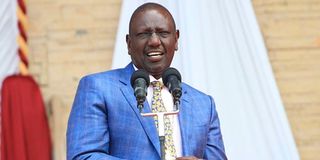Steering politics away from divisive ethnicity

Deputy President William Ruto address believers at Nyayo National stadium during a prayer service on July 16, 2022.
What you need to know:
- How to cure the negative effects of ethnic politics to avoid such a split or costly run-off is an important legal and political issue.
- By avoiding a run-off election, money is saved.
- Compared to the BBI consociational proposals, alternative voting is definitely a superior suggestion.
Give it to Dr William Ruto. He made a very good job this election in trying to frame the presidential elections beyond ethnicity.
However, the results split the country into two almost equal voting blocks, which almost morphed into a costly second-round election.
These blocks remain largely underpinned by ethnic politics.
How to cure the negative effects of ethnic politics to avoid such a split or costly run-off is an important legal and political issue.
Kenya is not unique in ethnicisation of politics.
Rwanda, Somalia, Burundi, and Nigeria (Biafra), among other African countries, have suffered due to ethnic politics.
Advanced countries have not been spared this problem, either.
Long-running dispute
Catalonia in Spain has made attempts to secede on ethnic and language grounds.
Northern Ireland in the UK has had a long-running violent dispute hinged on culture. Belgium and Switzerland's constitutions mirror ethnic divisions.
Constitutional experts have proposed several measures to address the problem of ethnic politics in various countries.
These measures include nation-building efforts and consociational and centripetal constitutional measures.
Nation-building refers to a set of rules and policies aimed at morphing distinct ethnic identities that may exist in a state into one single national identity.
These measures include common language policies and educational curricula.
In Kenya, making English and Kiswahili official languages is an example of such an effort. However, these measures take a long time to produce the desired results.
Main ethnic groups
Consociational measures refer to constitutional and legal arrangements that create national political structures that comprise the main ethnic groups.
In simple terms, it is creating political positions that enable the main ethnic groups to share power.
That was the rationale behind the Building Bridges Initiative (BBI) and its attempt to establish prime ministerial posts.
Northern Ireland, Lebanon and Iraq have used such methods.
In Lebanon, power is shared among Shia Muslims, Christians and Sunni Muslims.
The main demerit of this method is creating expensive political systems that are devoid of merit.
Such systems tend to be unstable as the ethnic groups often compete internally whilst sharing power.
For its part, centripetalism refers to the use of electoral systems that incentivise politicians to avoid extreme ethnic politics and move to the political centre.
One example of such an electoral system is alternative voting, ranked-choice voting or instant runoff voting. It is used in Australia, Sri Lanka, the UK and a few states in the USA.
In such a system, voters do not elect a single candidate in respect of a certain post.
Instead, voters rank candidates from the most preferred to the least popular.
For example, if it was in Kenya, a voter might have voted by ranking Ruto 1, Raila 2 and Wajackoyah 3, instead of just voting for one of them.
When it comes to counting, if candidates fail to achieve the set threshold to be declared outright winner (say 50 per cent plus one), instead of a run-off, second preferred votes for the last candidate are transferred accordingly.
Assume Wajackoyah came last in the first count. His supporters’ second preferred votes will now be counted, in that order, until an outright winner is declared.
The practical effect of such a system is to incentivise politicians to seek support across the country, beyond their ethnic strongholds, at least to garner second preferential votes.
To that end, politicians have to moderate their rhetoric as every corner of a country matters politically.
By avoiding a run-off election, money is saved.
However, it can be argued that it's a complicated system. This can be remedied through civic education.
Compared to the BBI consociational proposals, alternative voting is definitely a superior suggestion.
Dr Kang’ata is the Governor of Murang’a County





